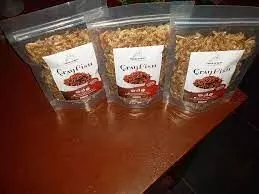- Home
- /
- Features/Spotlight
- /
- Modernizing Oron...
Modernizing Oron crayfish market to generate income, jobs

Crayfish is one of the most important types of seafood used as seasoning for all types of food in Nigeria.
It is mostly found in riverine areas of Nigeria, but oron crayfish is distinct from others due to its sand-free nature and sweet aroma and taste.
In addition to crayfish, Oron is also blessed with other seafood like periwinkle, crabs, and assorted types of fish.
Mr. Bassey Efiong, an indigene of Oron, said since the Oron crayfish caught the attention of many people due to its uniqueness, it has attracted many people to not only the town but also the entire Akwa Ibom region.
According to Efiong, until recently, transactions in crayfish were only conducted within the state, but now it is getting patronage from neighboring states such as Abia, Imo, and Enugu.
However, in recent years, the story has dramatically changed as it gets patronage from as far away as states in the northern part of the country.
"We, the owners of this product, never knew how unique and important it is until we started seeing our Igbo sisters and brothers coming to this place to buy crayfish."
"You know how good the Igbos are at business. They extended the business to big markets in Kano, Kaduna, Abuja, and even Lagos state.
Mrs. Victoria Erhinyola, a businesswoman, said she had been engaged in the crayfish business for some years and has realized that Oron crayfish is different from others.
"I am from Delta, and I have been in this business for a while now. I switched over to Oron crayfish when I realized that it is a different species than others.
One of the challenges faced by the fishermen is attacks by pirates, and Mr. Gabriel Mkpeti, a fisherman, said the attacks always come at a heavy financial cost to the fishermen.
Mkpeti said his group recently lost two engine boats during one of these attacks and had to pay N200, 000 for each of the boats before they were released by the militia.
"Sea pirates are the major challenge we face." They have forced many fishermen to quit fishing.
"Besides, prices in fishery equipment have gone higher than we can afford," he said.
Although the economic and social impact of the crayfish market is hazy due to the unavailability of data, one of the traders, Mrs. Nkechi Nkem, said it has impacted her life positively.
Nkem said she started the business with $25,000 and one bag of crayfish in 2012, adding that her business has grown exponentially as she now has a large customer base in Abia and Kaduna states.
She said it has also helped her take care of family needs such as education and health bills.
According to her, the market is also a huge employer of labor in the state, ranging from fishermen to petty and big-time traders.
She said, "The Oron seafood market employs a very large number of businessmen and women." Akwa Ibom and the Nigerian government should start thinking about modernizing the market.
"I learned some traders are moving crayfish from her to as far away as Cameroon." It is a major source of income for the local residents and the local government here. So, there is a need to modernize it and make it more attractive than it is now.
Nkem, however, said the market has the potential to contribute more to the local economy if the right policies are put in place to maximize that potential.
Mrs. Juliana Iwochukwu of the Agric Extension Department, University of Nigeria, Nsuka, said the market could benefit the community more if crayfish-related factories are located in the area.
This is contained in her report on "Practices of Farmers in the Processing and Marketing of Crayfish in Akwa Ibom."
"In countries like the U.S.A., China, and Australia, harvested crayfish are generally packed into open mesh vegetable sacks for refrigeration, storage, and processing for other value chains."
"If this is also done in Nigeria, it will go a long way to reduce wastage because crayfish farmers in rural areas still adopt old ways of crayfish processing before transporting them to other parts of the country," she said.
According to her, farmers most times, lack the proper storage facilities for their processed crayfish which may lead to spoilage of the product, deterioration of crayfish during processing, heavy loss and poor yield.
She identified other challenges such as poor market structure, a poor road network, and poor access to credit and finance as factors that affect marketing the product.
According to her, the government's policies on the fish sub-sector seem to be directed towards increasing production with little emphasis on processing and preservation.




